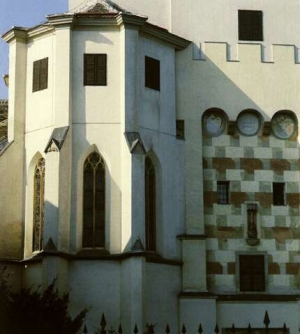Map
| Hotels
| Sights
| Wellness, Spa
| Travel Services
| Business Travel
| Programs
in Győr:
Hotel - Sight - Wellness, Spa - Travel Service - Business Travel
Other information:
Káptalan hill has been the centre of the city for centuries. Here you can find Püspökvár, the seat of the one thousand year-old episcopate of Győr, which boasts the living tower from the 13th century and the Dóczy chapel from the 15th century.
In the foundation of the castle the remains of Roman buildings were found. Its oldest part is the lower part of the tower castle, the so-called escape corridor and the cross vaulted room connected to it, from the 14th century. The Gothic chapel, which was built by Bishop Orbán Dóczy in 1481-86, is a rare example of multi-storey castle chapels. After the battle of Mohács (1526) the castle became the possession of the castle captains. Due to the threatening Turkish occupation, the castle was continuously fortified. The largest rebuilding took place between 1561 and 1575 according to the plans by Pietro Ferrabosco from Italy. Despite the fortification the castle was occupied by the Turks on 29 September 1594. Four years later, on 28 March 1598 it was re-occupied by the Hungarians, but it was not until the middle of the 18th century that the bishops could move back to their seat. Bishop Ferenc Zichy (1743-1783) had the building restored and extended and it was given its present form. The last renewal of the castle and the palace was completed in 1984. During the renovation parts of the mediaeval tower facade were found on the walls of the tower, which were also restored. In June 2004 a permanent exhibition was opened on bishop Vilmos Apor, who was shot dead by the Russian soldiers in the cellar under the castle in 1945. The exhibition commemorates Vilmos Apor's martyrdom: it presents his life and career, it evokes his martyrdom and death. Bishop Apor's martyrdom and sacrifice is commemorated by presenting parts of his diary as well as personal belongings, documents, music and light effects and other audiovisual techniques.
In the foundation of the castle the remains of Roman buildings were found. Its oldest part is the lower part of the tower castle, the so-called escape corridor and the cross vaulted room connected to it, from the 14th century. The Gothic chapel, which was built by Bishop Orbán Dóczy in 1481-86, is a rare example of multi-storey castle chapels. After the battle of Mohács (1526) the castle became the possession of the castle captains. Due to the threatening Turkish occupation, the castle was continuously fortified. The largest rebuilding took place between 1561 and 1575 according to the plans by Pietro Ferrabosco from Italy. Despite the fortification the castle was occupied by the Turks on 29 September 1594. Four years later, on 28 March 1598 it was re-occupied by the Hungarians, but it was not until the middle of the 18th century that the bishops could move back to their seat. Bishop Ferenc Zichy (1743-1783) had the building restored and extended and it was given its present form. The last renewal of the castle and the palace was completed in 1984. During the renovation parts of the mediaeval tower facade were found on the walls of the tower, which were also restored. In June 2004 a permanent exhibition was opened on bishop Vilmos Apor, who was shot dead by the Russian soldiers in the cellar under the castle in 1945. The exhibition commemorates Vilmos Apor's martyrdom: it presents his life and career, it evokes his martyrdom and death. Bishop Apor's martyrdom and sacrifice is commemorated by presenting parts of his diary as well as personal belongings, documents, music and light effects and other audiovisual techniques.
|
|
Püspökvár és Püspöki Palota - Hungary - Győr (Sight: Sight) |
Püspökvár és Püspöki Palota - Ungarn - Győr (Sehenswürdigkeit: Sehenswürdigkeit) |
|
|
||
|
Saturday, 10. January 2026. - 07:39:02 |
||


